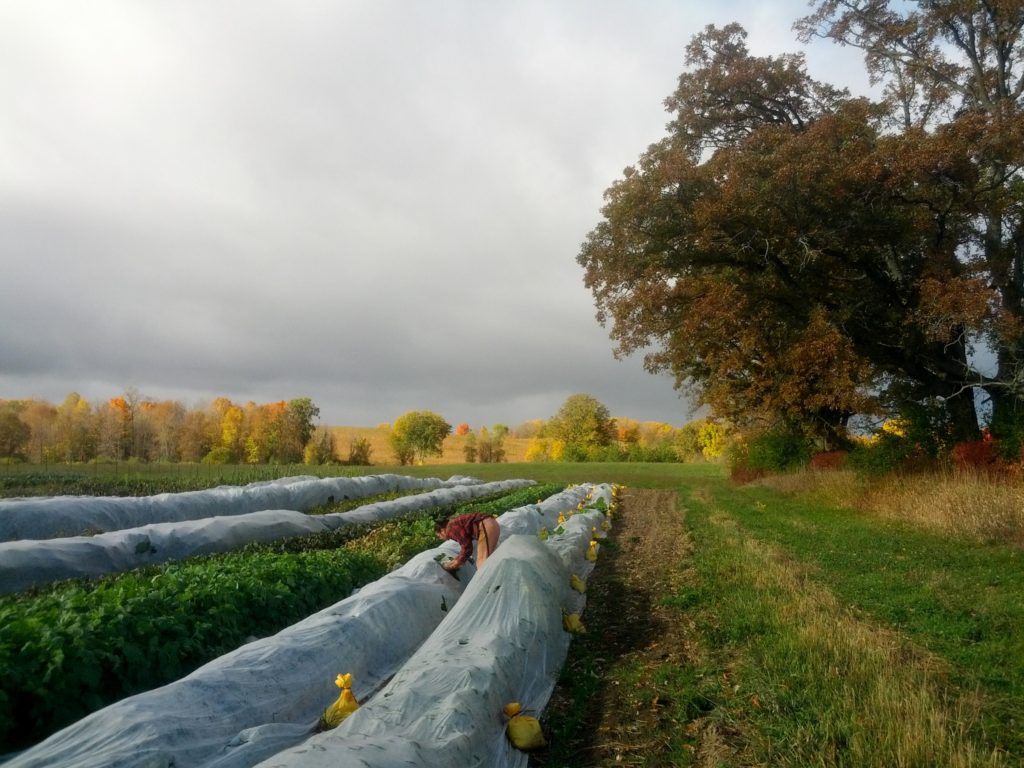
On growing things
Selling vegetables at a farmers’ market isn’t normally a polarizing affair. But I do have a distinct memory of a man who picked up a bunch of green onions off my table and contemptuously tossed them back at me, telling me that he could get three times as many onions at the price I was selling them.
Abrasiveness notwithstanding, I can understand where the onion man was coming from. The idea of locally grown food is no longer a peripheral concept in our society’s collective consciousness, and, as with any mainstream trend that rapidly catapults itself into the realm of questionable claims and hyperbolic endorsements, it’s hard not to roll your eyes at the seemingly overpriced produce at farmers’ markets or to disengage from the organic-no-spray-won’t-give-you-cancer rhetoric.
So, as I anticipate the coming growing season, I want to talk about why the food I grow on our little farm in the crook of the Trent River consists of so much more than overpriced calories with great Instagram photo potential and hipster cred.
♦
When I started university, I was introduced to the concept of first principles – the root axioms from which equations were derived and used to solve problems. As an engineering student, it was not practical to know how to derive each and every equation we used. Rather, our focus was to learn how to apply them. Bright-eyed and overly confident, I initially balked at using these equations without fully understanding how they came to be (at that point, I don’t think I really understood that engineering was an applied science…). An onslaught of midterms, exams, and sleep-deprived weeks later, my mental hang-ups were thoroughly suppressed. If I was going to survive school, first principles were not something to concern myself with.
Like engineering, modern society has derived many useful ‘equations’ to make life easier for us. While most of our basic needs for survival have not changed much from our more ‘primitive’ forebears, very few of us directly deal with these ‘first principle’ needs today – for the most part, we do not concern ourselves with building our own shelters, collecting our own water or growing our own food. Almost every aspect of our lives (especially urbanized life) depends on some sort of mediation or abstraction between us and the natural world, whether it is the concrete between our feet and the soil, or the invisible yet omnipresent economic system that regulates the way we value all the things we need in order to live.
Just as engineering gains power and usefulness by employing the derivatives of first principles, modern life has brought us untold power and convenience by providing us with its mediation. However, the gifts of modern life come at a societal and personal cost that is often difficult for us to acknowledge. Even if we ignore (not that we should!) the incredible destruction of the natural world that we are collectively capable of, I think that we, as individuals, also miss out on a whole lot when we uncouple our lives from the physical things that nourish us day by day.
Maybe I’ve just never shaken the habit, but I still have that urge to go back to first principles. When I do, every mundane aspect of being human, whether it’s eating or staying warm, grows richer with context and takes on more dimensions – the intense satisfaction when I watch a plant cycle from seed to fruit back to seed, the weightiness when I decide which chicken to slaughter or which tree in the forest to fell and cut into firewood. Being so directly involved forces me to acknowledge the space I occupy in this world, and reconcile with that knowledge, whether it is joyful or tragic, beautiful or ugly.
Note – given how discourse these days seems to get immediately compressed into one-dimensional polarized rhetoric – I am not saying that we should all denounce progress, strip down to loin cloths, and live as one with Nature.
However, I do think that in a world that tends toward rifts between us and the tangible things, I take great joy in tending the other way, mending those rifts – for myself, and hopefully for others too, creature and human alike.
♦
Going back to local food, when you eat food grown on our farm (or any other small farm, for that matter), you get to participate in a relationship with food that has much more to do with the regional idiosyncrasies of our southern Ontario climate than the economic feasibility of flying goods in from halfway across the world. It’s a choice that supports a more direct and richly diverse relationship with farmers, the local economy, and the land – a chance to mend the rifts that modern society has produced.
Of course, it is all too easy to take myself so seriously while I lounge in front of a crackling fire in the wood stove, notably un-sore and un-sweaty, writing away. Come summer, you’ll be sure to hear me complain about the lack of rain, the lack of sun, my aching back, the multitude of bloodsucking bugs…
So, if anything I have said appeals to you – whether it’s farming in its lofty potential or its un-glorious sweaty grind – I hope to see you some time this summer.
Here’s to another growing season!